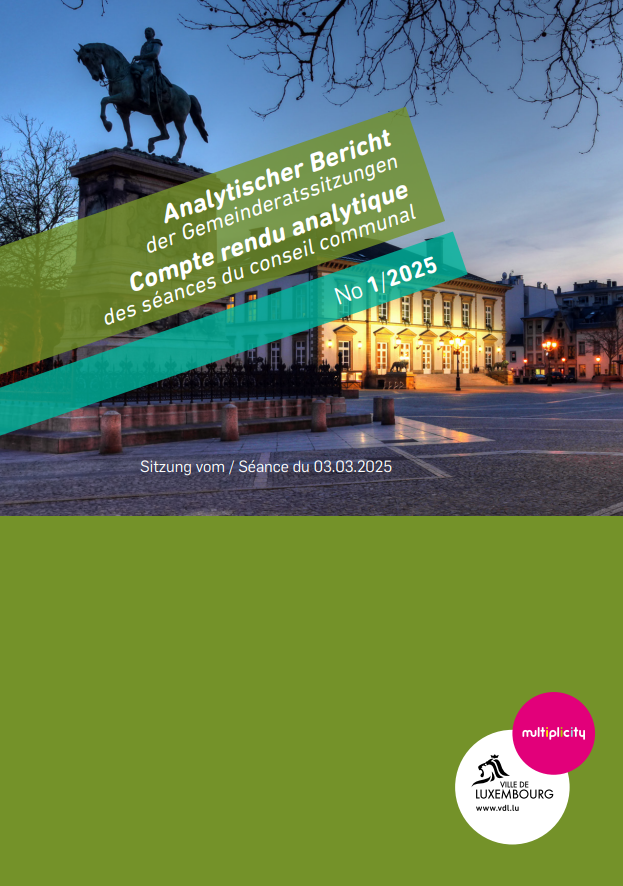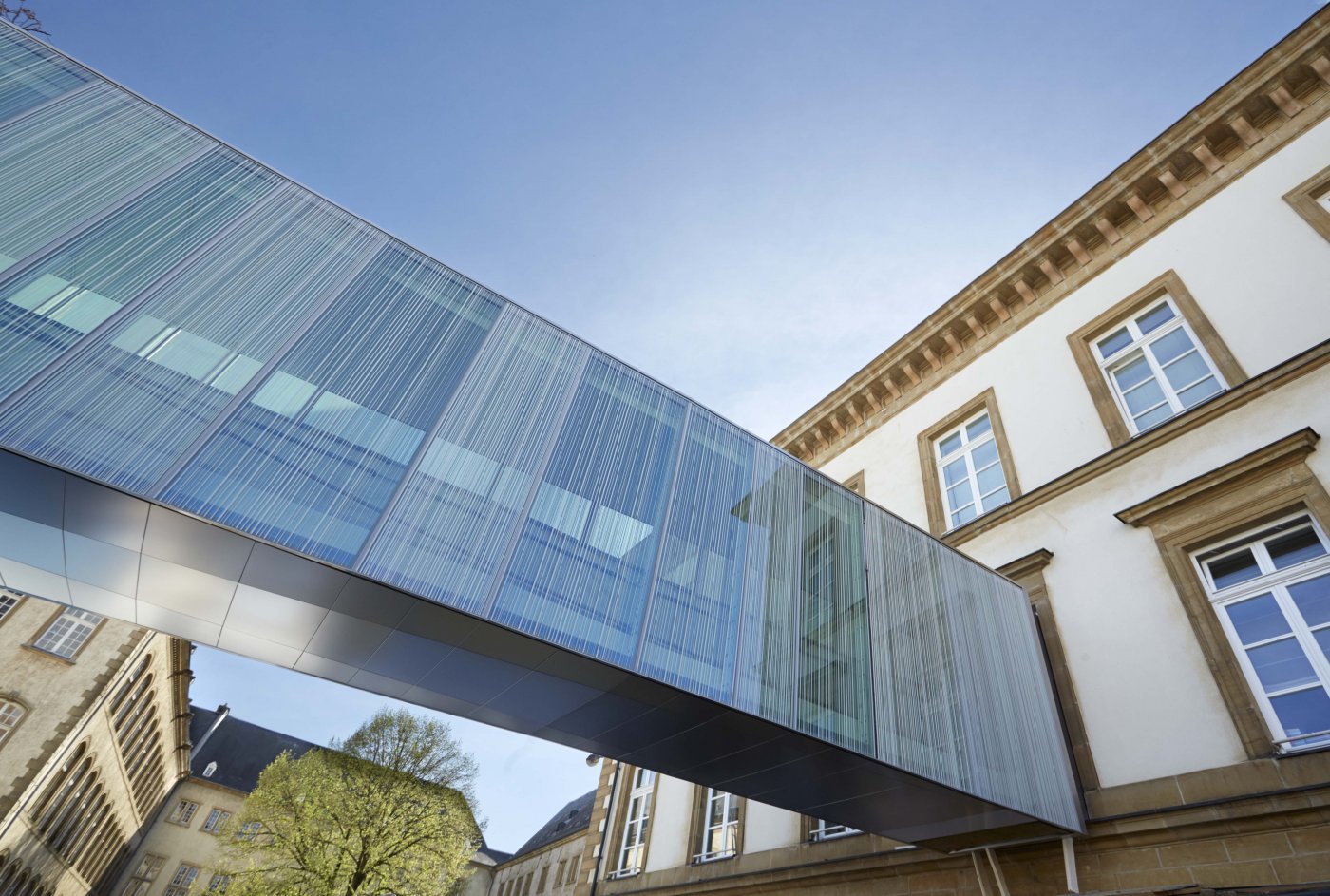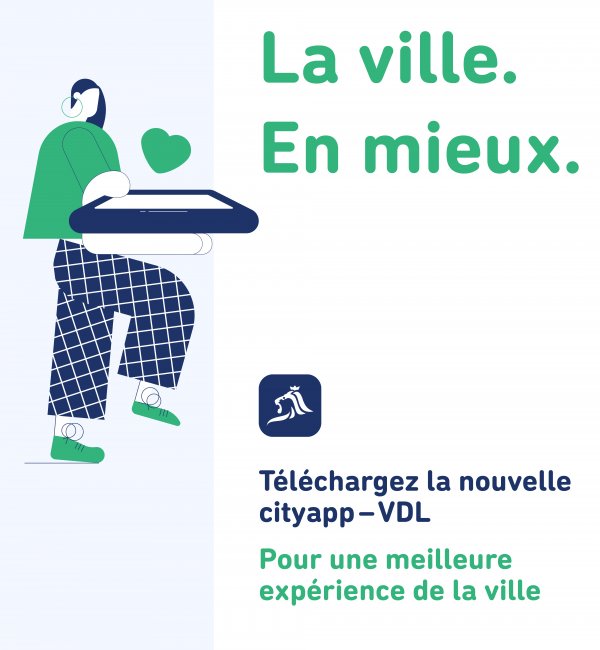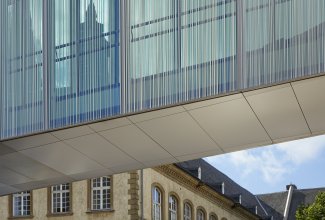Closed session
1. Office social (Social welfare office): personnel matters – opinion.
2. Municipal hospices: personnel matters – opinion.
3. Personnel matters – decision
Open session
4. Questions asked by Municipal Councillors.
5. Traffic: permanent amendments to the traffic regulations – temporary regulations – confirmation of temporary regulations – decision.
6. Agreements – approval.
7. Work estimate – approval:
- Detailed final plans to build five two-family homes on Rue Michel Théato (Lots 41-42 and 62-63-64 of the "Parc des Aubépines" PAP) in Belair.
8. Urban planning:
- Listing of the building located at 2, place de l'Europe as a national cultural heritage asset – opinion.
- Listing of the building located at 69, avenue Pasteur as a national cultural heritage asset – opinion.
- Subdivision of land pursuant to Article 29 of the law on municipal planning (loi concernant l'aménagement communal) – decision.
Download
9. Additional allocation for work on swimming pools – decision.
10. Awarding of grants – decision.
11. Motion tabled by the LSAP group for a reform of the criteria for awarding municipal grants – presentation.
12. Congrégation des Sœurs Hospitalières de Ste Élisabeth: sale of a plot of land – opinion.
13. Legal affairs: authorisations to initiate legal proceedings – decision.
14. Creation/elimination of staff positions – decision.
Live broadcast of meetings
Watch the video recording of this session.
Summary record
The summary record is a transcript of the discussions held and decisions taken by the Municipal Council. As such, it is an important source of information for citizens of the capital with regard to projects and measures that may have an impact on their daily life.
Keep reading

Keep reading

Questions asked by Municipal Councillors
Electric vehicle charging stations
Question posed by Nicolas Back
With the Integrated National Energy and Climate Plan (Plan national intégré énergie-climat – PNEC), the government outlined an ambitious increase in the number of electric vehicles, an initiative we support. However, Luxembourg City residents face practical problems when it comes to charging their vehicles: some old houses do not have a garage, and few residential buildings currently have charging stations. As such, to be able to make the transition to electric mobility, Luxembourg City residents depend on a dense network of easily accessible public charging stations.
According to the website chargy.lu, around 138 charging stations (277 charging points) are installed in Luxembourg City. Over 60% of these charging points are installed in car parks or P+R facilities, and are therefore hard for residents to access. Only 40 of the 102 stations planned for the capital – based on the Ministerial Regulation of 2 May 2023 establishing a general plan for public electric mobility infrastructure (règlement ministériel du 2 mai 2023 fixant un plan d'implantation général pour l’infrastructure publique liée à la mobilité électrique) – are installed in residential districts. This means that the charging network is not very dense. Given that electric mobility is growing, electric vehicle owners are increasingly facing the problem of not being able to find available public charging stations, or having to use stations that are far from their homes. If we do not want to hinder the development of electric vehicles, and want to provide residents with a high-quality service, it is crucial that we extend the network of charging stations further, to provide coverage in residential districts.
- Does the College of Aldermen agree that the current network of public charging stations does not meet the needs to achieve the objectives of the PNEC?
- Does the City have any data on the need for public stations, compared to the number of electric vehicles in circulation or registered in Luxembourg City?
- Why hasn't the City committed to installing more charging stations in residential districts, rather than in car parks?
- How does the City plan to contribute to the extension of a network of public charging stations in the future? What measures are planned, and what is the timetable?
Response provided by Alderman Patrick Goldschmidt
I do not share the negative view of the situation that Councillor Back expresses in his question. The charging stations were rolled out in Luxembourg City in accordance with the Grand Ducal Regulation of 3 December 2015 on public electric mobility infrastructure (règlement grand-ducal du 3 décembre 2015 relatif à l'infrastructure publique liée à la mobilité électrique) and the Ministerial Regulation of 5 February 2016 establishing a general plan for public electric mobility infrastructure (règlement ministériel du 5 février 2016 fixant un plan d'implantation général pour l'infrastructure publique liée à la mobilité électrique) for the entire country. The charging stations that are part of the share allocated to the capital were installed in the planned locations – namely, on public thoroughfares and in certain car parks.
I do not think that a lack of charging stations in the residential districts is hindering the development of electric vehicles. Many people are still buying electric vehicles, and many of them install charging stations at their homes.
In response to the increasing number of electric vehicles, the previous government issued a circular to all municipalities, asking them to propose options for distributing charging stations in their municipality. The College of Aldermen commissioned a specialised consultancy firm to develop an implementation and concession policy as part of the planning for the extension of public electric mobility infrastructure in Luxembourg City. The consultancy firm analysed several scenarios (small, medium or large increase in the number of electric vehicles), taking into account technical advances in electric-vehicle battery ranges and Creos's options for extending the network. The option of installing charging stations at petrol stations was also considered. The consultancy firm recommended issuing a call for applications, with a view to awarding the concession to manage the public charging stations to a single economic operator. The consultancy firm is currently drafting the corresponding specifications. These specifications are expected to be available by the start of the summer holidays, and the public tender is expected to be completed in late 2025. The public locations where the charging stations will be installed will be determined by the relevant City department in consultation with Creos.
Smart water meters
Question posed by Nicolas Back
The City of Luxembourg is in the process of replacing all of its traditional water meters with LoRaWAN smart meters, i.e. smart metres that support the Long-Range Wide Area Network (LoRaWAN) remote communication protocol. As part of this initiative, the City conducted a pilot project in Limpertsberg. Five years ago, the managers of the electricity and gas distribution networks introduced a system of smart meters that can collect electricity- and gas-consumption data on a daily basis.
With this system, it is easy to integrate other meters – such as for water and heat – and to share the data with the respective network managers, who can then better track consumption and more quickly detect losses.
Against this backdrop, the City of Dudelange issued a call for proposals for smart water meters that can be integrated into the Luxmetering system. This call for proposals mentioned that better prices could be achieved if several municipalities purchased water meters from the same supplier.
- Has the City of Luxembourg been in contact with the City of Dudelange to discuss their experience with their smart water meters, and how the two cities could join forces to purchase meters so as to reduce costs for everyone, which would be a win-win situation? If so, what was the outcome? If not, why have there been no discussions on this topic?
- Has the City of Luxembourg been in contact with Luxmetering to discuss how the City could be incorporated into the national Luxmetering system?
- Has the City conducted a technical and economic study on the different options (LoRaWAN or Luxmetering)? What were the technical and economic findings on the two options?
- What is the granularity of the measurements provided by the LoRaWAN meters (water consumption per half hour, per hour, etc.), and how frequently are they transmitted (once a day, every six hours, etc.) to the City of Luxembourg's central system?
- Are there plans to share real-time data with city residents on a daily basis? If so, how does the College of Aldermen plan to do this?
- Can the LoRaWAN system cover all of Luxembourg City's meters?
Response provided by Alderwoman Simone Beissel
The City chose the LoRaWAN system because it allows the City to manage the infrastructure independently. The LoRaWAN system was also chosen out of concern for the security of customers' personal data.
The City of Luxembourg has been in contact with the City of Dudelange, which chose the Luxmetering system, a national collection system. However, we chose a different option because the Luxmetering system would have entailed sharing data with third-party recipients – that is, a private company. In accordance with applicable laws, the private company is considered the data controller. The City would have been responsible only for the truthfulness and accuracy of the data entered on the platform. In putting in place its own network – instead of using a private company's network; Luxmetering uses the network operated by the Belgian company Proximus NXT –, the City of Luxembourg acted in line with its policy, which entails remaining as autonomous as possible, and avoiding the use of private companies insofar as possible. The Service Eaux (Water Department) is considered an essential operator within the meaning of the NIS 2 directive, which requires the implementation of strict measures against cybercrime.
In addition to being used for water-meter data, the LoRaWAN system will be used – in the sense of a smart city – for a host of applications developed by other City departments. For example, it will be used to control access to fire hydrant covers and water system inspection chambers, to monitor the water level in rivers to help prevent flooding, to monitor air quality, and to manage electricity and heat use in City-owned buildings (smart buildings). We are fortunate to have a management system that already uses artificial intelligence.
The meters store information on the measured volumes in hourly registers, but the data is transmitted only every seven or 12 hours. This way, customers will not feel as though they are being monitored, a fear some customers expressed when the remote data transmission system was introduced.
In choosing the LoRaWAN system, the City of Luxembourg therefore chose a high-performance system that is fully in line with its needs.
Reducing household waste in Luxembourg City
Question posed by Linda Gaasch
Luxembourg City generates too much waste. Despite waste management efforts, the capital produces more residual waste per resident than the other municipalities. At the same time, the recycling rate is lower, despite national targets that stipulate a recycling rate for urban waste of at least 55% in 2025, 60% in 2030 and 65% in 2035. Contributing to these targets is also one of the City of Luxembourg's objectives.
- What is the City of Luxembourg's strategy to reduce the amount of waste as quickly as possible to a very low level, or even to zero? Is there an action plan that includes clear targets – namely, quantities and time frames?
- How is the City contributing to achieving the national household waste recycling targets? What strategy is being implemented to increase the proportion of household waste that is recycled in Luxembourg City?
- A ministerial circular dated 5 February 2025 presents the findings on waste management at the municipal or inter-municipal level for 2023, based on data collected through the waste management assessment tool. Since there is no data for the City of Luxembourg, one could assume that the City did not take part in this initiative. Why didn't the City take advantage of this offer to have its waste management assessed? Will it participate in the future?
- To increase the proportion of recycled organic waste, are there plans to provide residents with biodegradable bags, as is done in other municipalities in the Minett-Kompost association? If so, by when? If not, why not?
- Could you give us more information on the how the City plans to implement the amendment to the tax regulation that seeks to reinforce the polluter pays principle, and to reward residents who reduce their residual waste? Will this entail taxation by weight or by container?
- What is the projected timeline for completing the new resource centre in Merl? Where do things stand with the opening of a branch on the other side of the city?
- It was previously announced that support would be improved for non-professional organisers, with the creation of an "info point", logistics for providing and managing reusable dishes, fitting out municipal facilities, and posting helpful hints online. Where do things stand with this?
I would like to take this opportunity to ask an additional question about the Minett-Kompost association: some residents have reported that their green waste was not collected, even in the brown bins. Could you provide more detailed information about this?
Response provided by Alderman Patrick Goldschmidt
It is true that a lot of waste is generated in the city, but the numbers show that we are constantly improving. I don't know if there is another municipality in Luxembourg that does as much for recycling. The Service Hygiène (Sanitation Department) operates 24 hours a day and does outstanding work. Although the population of the capital grew from 107,340 in 2014 to 136,208 in 2024 (an increase of 26.89%), from 2013 to 2024 the amount of waste collected fell from 63,068 tonnes to 61,731 tonnes – that is a drop of 2.12%. This result is all the more encouraging since, during that period, not only was there a sharp increase in the population, there was also a sharp increase in the number of jobs. All of this is to say that we are heading in the right direction.
Between 2014 and 2024, the amount of mixed municipal waste fell from 38,588 tonnes to 34,293 tonnes (down 11.13%), while the amount of collected recyclable waste rose from 24,480 tonnes to 27,438 tonnes (up 12.08%). In 2014, each resident generated an average of 371.24 kg of waste, but this figure fell to 254.56 kg in 2024 (down 31.43%).
The City is continuing its efforts to further increase the amount of recycling. In Luxembourg City, there are 56 public collection stations for recyclable waste. Outreach campaigns are conducted in several languages. A customer assistance service offering guidance to residents has been operating for several years. We are now actively involved in planning everything we need to do to achieve the 65% recycling target by 2035. The new recycling centre – which we are currently working on, and which we hope to open in 2030 – should also help us achieve this target.
You mentioned the ministerial circular of 5 February 2025. This entailed filling out a very complicated questionnaire about 2023. Several City of Luxembourg municipal departments worked on it, but were unable to complete it on time because, unlike other municipalities that returned the questionnaire, they were very methodical. Nonetheless, for 2024, the City of Luxembourg did provide the requested information.
We have accomplished a great deal in the last few years. We have encouraged businesses and individuals to sort their waste; we launched the "Cup to go" programme; Repair Cafés are held in the city; and we engage in important educational work through our online portal and our printed media.
We are now working with an assessment tool called "Offallmatrix" ("waste matrix"), which will be used to develop a resource management policy as part of the Climate Pact 2.0. An external "circular economy" consultant has been involved since the beginning.
Associations receive guidance from the City – specifically, from the Environmental Officer, the Service Hygiène, the Service Architecte-Maintenance (Architecture and Maintenance Department) and others – so that the festivals they organise are as eco-friendly as possible. Information about this is also available on our website. The City has been providing cups for free since 2011, and also plans to offer plates and cutlery in the future.
We have been asked why we do not distribute biodegradable bags for free. The Minett-Kompost association, which the City belongs to, actually does this. Our representatives in the association are not in favour of these bags, because the law of 9 June 2022 stipulates that it is prohibited to collect or treat bio-waste and green waste together with plastics, whether biodegradable or not. The Minett-Kompost association provides its own certified bags. Businesses have told us that they can purchase the exact same bags, from the same supplier, at the supermarket, but that these bags are not accepted. We therefore recommend that residents dispose of this type of waste in the brown bin using a bucket or in paper bags. Our staff members who work in this area are continuing their discussions with Minett-Kompost to figure out how best to proceed.
As for the creation of a second resource centre, in addition to the one in Merl, feasibility studies are underway to find an appropriate site on the other side of the city, in the vicinity of Cents and Hamm. We hope that this project will be completed in the coming years. This will help us increase the recycling rate even further.
Update on the implementation of Housing First projects
Question posed by Maxime Miltgen
In my previous question of 24 January 2024, I asked the College of Aldermen about the possibility of developing the Housing First model on a large scale, given how effective it has proven to be within the European Union, and in light of the homelessness situation in Luxembourg City.
- Since my last question, have any new Housing First projects been implemented, or are in the process of being implemented, in Luxembourg City?
- If so, how many units have been created, and what are the prospects for extending the programme?
- If no projects have been started or extended, why has nothing been done, when the social emergency requires fast, suitable solutions?
- Is there currently closer collaboration between the City and the Ministry of Family Affairs (Ministère de la Famille) with a view to creating more Housing First units in Luxembourg City?
Response provided by Alderwoman Corinne Cahen
We have seen positive developments with the Housing First scheme, and we will continue our efforts. We intend to incorporate Housing First units into all housing construction projects that are currently planned. The City has already provided the National Social Protection Committee (Comité national de défense sociale – CNDS) with four Housing First units in Rue de la Tour Jacob. As part of a new project, 12 Housing First units are planned in Rue Baudouin, some of which will also be accessible to people with reduced mobility. The summary draft project is currently being prepared, and will be presented to the College of Aldermen in the near future.
I frequently remind the relevant departments that we need both housing with support and housing without support.
The City provides financial backing for several other projects. As part of the "Les Niches" project being undertaken by "Jugend- an Drogenhëllef", 106 adults and 25 children have been housed in Luxembourg City or other regions in the country. Thirty-six adults and four children have been housed as part of the HUT (Hëllef um Terrain) housing programme. The Red Cross currently has nine rooms on Rue de Hollerich, but we are seeking a better solution because these rooms are not ideal, and are not fully in keeping with the Housing First concept. As part of a Housing First concept, residents need to feel at home, and that presumes that they do not need to share the bathroom or kitchen with other people.
Based on my experience as Minister of Family Affairs, I know that the Housing First concepts are very effective: many residents considerably reduce their drug or alcohol consumption, or even give up drugs or alcohol altogether. We are working closely with the Ministry of Family Affairs, which intends to create Housing First projects across the country. It is important to incorporate these accommodation units into other construction projects, because we do not want to create ghettos, but instead foster healthy social diversity. We have had excellent experiences in this regard in Luxembourg.
Postponement of the official opening of the Pétrusse Valley and user safety
Urgent question posed by Maxime Miltgen
The official opening of the Pétrusse Valley redeveloped area, with its playground for children, outdoor fitness trail and minigolf course, was supposed to take place on 29 April 2025. However, six days before the event, the College of Aldermen announced that the inauguration would be postponed until the opening date of LUGA 2025.
- Why exactly was the official opening on 29 April 2025 cancelled?
- Is it true that large rocks recently broke off from the rock face overhanging the park, and that was why the opening was postponed?
- If that is the case, why weren't measures to secure this rock face put in place before the development work on the playground, fitness trail and minigolf course began?
- Can the City guarantee the safety of users of the playground, minigolf course and fitness trail, especially children?
- Why is the minigolf course still not open to the public, and when exactly is it scheduled to open?
Response provided by Mayor Lydie Polfer
The National Roads Administration (Administration des ponts et chaussées), which works closely with the City's Service Parcs (Parks Department), is responsible for maintaining the rock faces in the Pétrusse Valley. The rock-cleaning and inspection works were completed in spring 2025. On 17 March, the director of the National Roads Administration notified the City in writing that the costs had skyrocketed due to additional work, and that further work on the bedrock was required and would be carried out by a specialist firm in the latter part of 2025. It has not yet been determined if nets will be used to prevent rocks from falling, or if the rocks will be secured using concrete. Whichever solution is chosen, it will also need to prevent objects from being thrown into the valley from the path that runs along the upper part of the promontory.
On 7 May 2025, we officially opened the playground and fitness area in the Pétrusse Valley. The people who were there saw that scaffolding had been installed. There is no risk that large rocks will fall into the valley. However, small pieces of rock may become detached from the rock face, especially now that the ivy that secured small stones on the rock face has been removed. After the scaffolding was installed, Luxcontrol conducted an assessment of the situation. Unfortunately, this solution was not feasible in the minigolf area, which extends to the rocks. Setting up scaffolding there would reduce the surface area of the minigolf course by too much. We therefore decided, in mid-April, not to open the minigolf course for the time being. During Easter weekend, several rocks fell onto the minigolf course.
We are now working with the government and the relevant contractors to find an alternative solution, which would entail either installing fencing along the rocks and systems to secure stones that could come loose, or extending a net across the rock face. The minigolf course will remain closed until we have received a clear response from the specialist contractors since, obviously, safety is our top priority. The agreement we recently signed with the minigolf course operator will, of course, be amended to reflect the new situation.
The next question is from Councillor Benoy, and is about the Apéri'Tours, the second round of which is due to begin tomorrow.
Cancellation of the car-free day in Luxembourg City
Urgent question posed by François Benoy
On 21 April 2025, ProVelo sent its potential partners an email advising them that the car-free day, which had been scheduled for 21 September in collaboration with the City of Luxembourg, had been cancelled. In that email, ProVelo noted that their vision of a "car-free city" and that of the City of Luxembourg diverged on a number of key points, and that, under those circumstances, they had decided not to support the project. According to a graphic sent on 17 March 2025, ProVelo wanted to organise the car-free day on a section of Boulevard Roosevelt and Avenue de la Liberté. I deeply regret that this initiative was cancelled.
- What were the requirements or conditions set by the City for the organisation of the car-free day in conjunction with ProVelo?
- What were the main points on which ProVelo's and the City's visions diverged?
- Why couldn't a compromise be reached, bearing in mind that in other cities, car-free days are organised on many more streets than what ProVelo had planned, or even in the entire city centre?
- Doesn't the City think that the cancellation of this event is unfortunate, particularly in light of existing climate issues, and considering that the City's Mobility Plan aims to substantially increase active travel?
- Would the College of Aldermen be willing to reconsider holding a real car-free day? If so, when could this be done?
Response provided by Alderman Patrick Goldschmidt
On 30 October 2024, ProVelo asked the City for permission to organise a car-free day. On 13 January 2025, we asked them to send us a detailed plan, which they did on 27 February. ProVelo planned to organise the event on a Sunday (21 September 2025), which would have been acceptable. However, ProVelo wanted to completely close off a number of major thoroughfares, most notably in Limpertsberg (where the finish line of the Tour de Luxembourg will be located on the same day), around Champ du Glacis, Avenue de la Porte Neuve, Boulevard Royal and so on. According to ProVelo's vision, these closures would have had to apply not just to cars, but also to buses; only the tram would have continued to run. We rejected this concept, stressing that all public transport services would have to continue to operate, since the tram does not serve all of the city's districts. After all, the slogan of mobility week was "Mobility for everyone", and that also includes people who cannot get around by bike or who have difficulties walking.
We suggested an alternative to ProVelo: a route that would go down Avenue de la Liberté, Pont Adolphe, Boulevard Roosevelt and the Pont Viaduc, with a celebratory event in Place de la Constitution (Gëlle Fra). We told them that the City could not organise this event since the Tour de Luxembourg was scheduled for the same day, and most of our available human resources were already assigned to that event. The Tour de Luxembourg also requires additional police personnel. We therefore told ProVelo that it should organise the car-free day itself and, for example, take responsibility for stationing people at intersections to ensure that everything runs smoothly in those locations. ProVelo said it had to submit this proposal to its members and its committee. It then decided to back out of organising a car-free day, and to focus on a bike festival in Place Guillaume II to mark the association's 40th anniversary. Even though this is not an event marking a 50th anniversary, the City is nevertheless willing to provide financial support for this event, especially since it will fall during mobility week.
Article 13, paragraph 3 of the Municipal Law establishes that each member of the Municipal Council, acting in their individual capacity, shall enjoy the right of initiative to add to the agenda drawn up by the College of Aldermen one or more proposals that they wish to submit to the Municipal Council.
Such proposals must be submitted to the Mayor in the form of a written reasoned request at least three days before the meeting of the Municipal Council.













